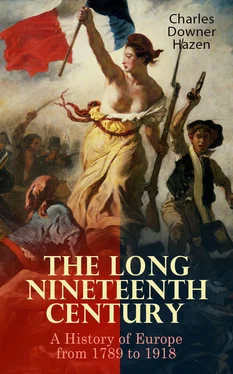By the Peace of Paris, which closed this epochal struggle, England acquired from France disputed areas of Nova Scotia, all of Canada, and the region between the Alleghanies and the Mississippi Paris River, and also acquired Florida from Spain. From France, too, she snatched at the same time supremacy in India. Thus England had become a veritable world-empire under the inspiring leadership of the 'Great Commoner.' Her horizons, her interests, had grown vastly more spacious by this rapid increase in military renown, in power, in territory. She had mounted to higher influence in the world, and that, too, at the expense of her old historic enemy, just across the Channel.
But all this prestige and greatness were imperiled and gravely compromised by the reign that had just begun. George III had, in 1760, come to the throne which he was not to leave until claimed by death sixty years later. "The name of George III," writes one English historian, "cannot be penned without a pang, can hardly be penned without a curse, such mischief was he fated to do the country." Unlike his two predecessors, he was not a German, but was a son of England, had grown up in England and had been educated there, and on his accession, at the age of twenty-two, had announced in his most famous utterance that he "gloried in the name of Briton." But wisdom is no birthright, and George III was not destined to show forth in his life the saving grace of that quality. With many personal virtues, he was one of the least wise of monarchs and one of the most obstinate.
His mother, a German princess, attached to all the despotic notions of her native land, had frequently said to him, " George, be a king." This maternal advice, that he should not follow the example of the first two Georges but should mix actively in public affairs, fell upon fruitful soil. George was resolved not only to reign but to govern in the good old monarchical way.
This determination brought him into a sharp and momentous clash with the tendency and the desire of his age. The historical significance of George III lies in the fact that he was resolved to be the chief directing power in the state, that he challenged the system of government which gave that position to Parliament and its ministers, that he threw himself directly athwart the recent constitutional development, that he intended to break up the practices followed during the last two reigns and to rule personally as did the other sovereigns of the world. As the new system was insecurely established, his vigorous intervention brought on a crisis in which it nearly perished.
George III, bent upon being king in fact as well as in name, did not formally oppose the cabinet system of government, but sought to make the cabinet a mere tool of his will, filling it with men who would take orders from him, and aiding them in controlling methods of Parliament by the use of various forms of bribery and influence. It took several years to effect this real perversion of the cabinet system, but in the end the King absolutely controlled the ministry and the two chambers of Parliament. The Whigs, who since 1688 had dominated the monarch and had successfully asserted the predominance of Parliament, were gradually disrupted by the insidious royal policy, and were supplanted by the Tories, who were always favorable to a strong kingship and who now entered upon a period of supremacy which was to last until well into the nineteenth century.
After ten years of this mining and sapping the King's ideas triumphed in the creation of a ministry which was completely submissive to his will. The ministry of which Lord North was the leading member, lasted twelve years, from 1770 to 1782. Lord North was a minister after the King's own heart. He never pretended to be the head of the government, but accepted and executed the King's wishes with the ready obedience of a lackey. The royal autocracy was scarcely veiled by the mere continuance of the outer forms of a free government.
Having thus secured entire control of ministry and Parliament, George III proceeded to lead the British Empire straight toward destruction, to what Goldwin Smith has called "the most tragical disaster in English history." The King and his tools initiated a policy which led swiftly and inevitably to civil war. For the American Revolution was a civil war within the British Empire. Party divisions were much the same in the mother country and in the colonies, Whigs versus Tories, the upholders of the principle of self-government against the upholders of the principle of the royal prerogative. In this appalling crisis, not only was the independence of America involved, but parliamentary government as worked out in England was also at stake. Had George III triumphed not only would colonial liberties have disappeared, but the right of Parliament to be predominant in the state at home would have vanished. The Whigs of England knew this well and their leaders, Pitt, Fox, Burke, gloried in the victories of the rebellious colonists.
The struggle for the fundamental rights of free men, for that was what the American Revolution signified for both America and England, was long doubtful. France now took her revenge for the humiliations of the Seven Years' War by aiding the thirteen colonies, hoping thus to humble her arrogant neighbor, grown so great at her expense. It was the disasters of the American War that saved the parliamentary system of government for England by rendering the King unpopular, because disgracefully unsuccessful. In 1782 Lord North and all his colleagues resigned. This was the first time that an entire ministry had been overthrown.
George the Third's attempt to be master in the state had failed and although the full consequences of his defeat did not appear for some time, nevertheless they were decisive for the future of England. The king might henceforth reign but he was not to govern. To get this cardinal principle of free government under monarchical forms established, an empire was disrupted. From that disruption flowed two mighty consequences.
The principles of republican government gained a field for development in the New World, and those of constitutional or limited monarchy a field in one of the famous countries of the Old. These two types of government have since exerted a powerful and an increasing influence upon other peoples desirous of controlling their own destinies. Their importance as models worthy of imitation has not yet been exhausted.
But the disaster of the American War was so great that the immediate effect was a decided impairment of England's prestige. It is a curious fact that after that she was considered by most of the rulers of Europe a decaying nation. She had lost her most valuable colonies in America. The notion was prevalent that her successes in the Seven Years' War had not been due to her own ability but to the incapacity of Louis XV, whereas they had been due to both. The idea that it was possible to destroy England was current in France, the idea that her empire was really a phantom empire which would disappear at the first hostile touch, that India could be detached far more easily than the thirteen colonies had been. It was considered that as she had grown rich she had lost her virility and energy and was undermined by luxury and sloth. At the same time, although in flagrant contradiction to the sentiments just described, there was a vague yet genuine fear of her. Though she had received so many blows, yet she had herself in the past given so many to her rivals and especially to France that they did well to have a lurking suspicion after all as to her entire decadence. The rivalry, centuries old, of France and England, was one of the chief elements of the general European situation. It had shown no signs of abating. The issues of the Revolution were to cause it to flame up portentously. It dominated the whole period down to Waterloo. In England the French Revolution was destined to find its most redoubtable and resolute enemy.
Читать дальше












